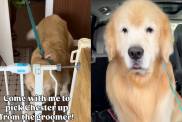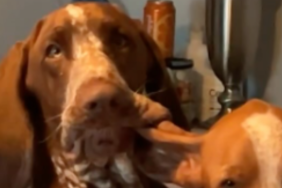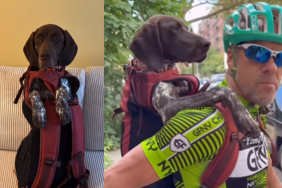Question:
My dog rolls over submissively whenever a larger dog approaches. Should I teach him to be more confident, and if so, how?
Answer:
Your dog is telling the larger dog that he is no threat — a pretty safe tactic in my opinion. Your dog has assessed the situation and determined that he is the low dog on the totem pole and just wants to make sure the other dog realizes that unequivocally so there is no trouble.
A great confidence-building exercise to teach your dog — believe it or not — is basic obedience. Be sure that your training methods don’t involve force or punishment because it sounds like your dog is sensitive, and sensitive dogs may become even more submissive with any punitive measures.
Why will obedience (such as “sit“) help? Because it will give your dog something else to concentrate on rather than being afraid. Because it also gives you a communication tool where you can instruct your dog what to do so he doesn’t have to decide how to act. The decision-making process may be extremely stressful for some dogs.
Be sure to use scrumptious treats and to train your dog when a larger dog is not approaching, such as in your living room, for a couple of reasons: You want him to become familiar with the exercise away from the scary thing so he associates the exercise with praise and food rewards from you. And, also, it’s difficult for your dog physiologically to eat and be afraid at the same time. After he’s learned to sit, work with him outside, again away from dogs. He can then transfer the sit to the other dog’s approach.
When the larger dog approaches, be sure to watch your dog and gauge the distance from the other dog when his body language begins to change. You’ll want to put your dog in a sit before he starts rolling over.
Finally, stand in front of your dog between him and the larger dog so he knows that you control the space and feels safe.
An alternate method is: When your dog sees the other dog before he begins to roll over, move out of the way so that there is increased distance between the two dogs, and give your dog scrumptious treats until the other dog passes by. In time, he will learn that the sight of a larger dog means that he will be getting treats and will change the way he thinks from “oh-no-there’s-a-big-scary-dog” to “oh-boy-there’s-a-big-dog-and-I-get-some-treats.”
When your dog is relaxing, then in a happy voice say something like, “Let’s go and meet the dog!”
And lastly, please have patience. Overcoming fears takes a long time, and we humans get impatient.









